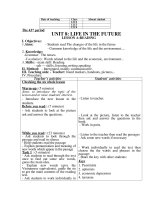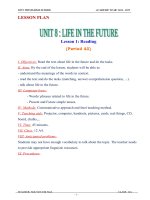Unit 8 Life in the future
Bạn đang xem bản rút gọn của tài liệu. Xem và tải ngay bản đầy đủ của tài liệu tại đây (370.27 KB, 33 trang )
Let’s watch a short film
UNIT 8
LIFE IN THE FUTURE
E. LANGUAGE FOCUS
I. Grammar
I. Grammar Prepositions and articles
1. Prepositions.
a. Prepositions of time: at, on, in
Look at the following sentences and tell me
the usages of the prepositions
1. I have a meeting at 9am.
2. The shop closes at midnight.
3. Jane went home at lunchtime.
4. In England, it often snows in December.
5. Do you think we will go to Jupiter in the future?
6. There should be a lot of progress in the next
century.
7. Do you work on Mondays?
8. Her birthday is on 20 November.
9. Where will you be on New Year's Day?
We use:
- at for a PRECISE TIME
- in for MONTHS, YEARS, CENTURIES and
LONG PERIODS
- on for DAYS and DATES
at
in
on
PRECISE TIME
MONTHS, YEARS, CENTURIES and
LONG PERIODS
DAYS and DATES
at 3 o'clock
in May
on Sunday
at 10.30am
in summer
on Tuesdays
at noon
in the summer
on 6 March
at dinnertime
in 1990
on 25 Dec. 2010
at bedtime
in the 1990s
on Christmas Day
at sunrise
in the next century
on Independence
Day
at sunset
in the Ice Age
on my birthday
at the moment in the past/future
on New Year's Eve
Notice the use of the preposition of time at in the
following standard expressions:
Expression
Example
at night
The stars shine at night.
at the weekend*
I don't usually work at the
weekend.
at Christmas*/Easter I stay with my family at
Christmas.
at the same time
We finished the test at the same
time.
at present
He's not home at present. Try
later.
Notice the use of the prepositions of
time in and on in these common expressions:
in
in the morning
in the mornings
in the afternoon(s)
in the evening(s)
on
on Tuesday morning
on Saturday mornings
on Sunday afternoons
on Monday evening
I. Grammar
Prepositions and articles
1. Prepositions.
a. Prepositions of time: at, on, in
Look at the following sentences and tell me
the usages of the prepositions
b. Prepositions of place: at, on, in
Look at these examples:
•Jane is waiting for you at the bus stop.
•The shop is at the end of the street.
•My plane stopped at Dubai and Hanoi and
arrived in Bangkok two hours late.
•When will you arrive at the office?
•Do you work in an office?
•I have a meeting in New York.
•Do you live in Japan?
•Jupiter is in the Solar System.
•The author's name is on the cover of the book.
•There are no prices on this menu.
•You are standing on my foot.
•There was a "no smoking" sign on the wall.
•I live on the 7th floor at 21 Oxford Street in London.
In general, we use: •at for a POINT
•in for an ENCLOSED SPACE
•on for a SURFACE
at
in
on
POINT
ENCLOSED SPACE SURFACE
at the corner
in the garden
on the wall
at the bus stop
in London
on the ceiling
at the door
in France
on the door
at the top of the page
in a box
on the cover
at the end of the road
in my pocket
on the floor
at the entrance
in my wallet
on the carpet
at the crossroads
in a building
on the menu
at the front desk
in a car
on a page
Notice the use of the prepositions of place at, in and on in
these standard expressions:
at
in
on
at home
in a car
on a bus
at work
in a taxi
on a train
at school
in a helicopter
on a plane
at university
in a boat
on a ship
at college
in a lift (elevator) on a bicycle, on a motorbike
at the top
in the newspaper
on a horse, on an elephant
at the bottom
in the sky
on the radio, on television
at the side
in a row
on the left, on the right
at reception
in Oxford Street
on the way
I. Grammar
Prepositions and articles
1. Prepositions.
a. Prepositions of time: at, on, in
b. Prepositions of place: at, on, in
c. Prepositions used in some expressions
1. On time: go to class on time
go to work on time
In time for sth/to do sth: come home in time to
have dinner/to watch a TV program
2. To die of a disease/hunger/thirst
To die for the country/ the children
To die in: die in a car crash, die in an accident
3. To be on business/ to go on business
in business = a businessman
4. To believe in sth/sb
5. To warn sb about/against sth
To warn sb of sth
6. To be famous for sth
7. To get married to sb:
8. In the end = finally
At the end of sth: At the end of the lesson/ the meeting
Exersice1: Choosing the appropriate
prepositions.
1. Luckily, you are ….. time for the meeting.
A. in b. on
c. at
2. Many people are dying …..various types of
cancer.
A. of b. by
c. on
3. I will not be here next week. I am going to
be …..business in Mexico.
A. on b. in c. of
4. ….
4. ….the end of the book, they get married and
live happily ever after.
B.
C. On
A.In
At
5. Thank you for everything you’ve done. You are
a true friend ….me.
B. to
A. of
C. in
6. I can’t believe… you. You always let me down.
B. to C. at
A. In
7. I have warned you …. the difficulties you have
to face when applying for the job.
A. on
C. to
B. about
8. Britney Spears is famous… her beautiful face
and sweet voice.
A. by
C. of
B. for
9. The bookshop is…. The chemist’s and the
butcher’s and ……the library.
A. among/opposite
B.between/opposite
C. between/ across
10. Next year, I’m going to get married…. John
and we are going to move to Bristol.
A. to
B. with
C. for
2. The articles.
Indefinite articles and definite articles.
Look at the following sentence and compare the
use of a, an and the:
An old man and a young girl are sitting
opposite me. The old man is French and the
young girl is English.
Yesterday I bought an English book and a
literature book. The English book is
interesting but the literature one is boring
The Article
1. The indefinite article:
USAGE:
• A: used before words that begin with a consonant.
An: used before words begin with a vowel.
•used with professions;
a teacher
an architect
• with some expressions of quantity:
Eg: a pair of (shoes)
a hundred, a thousand, a little, a few
• in exclamations with What + a countable noun
Eg: What a lovely day!
What a pity!









